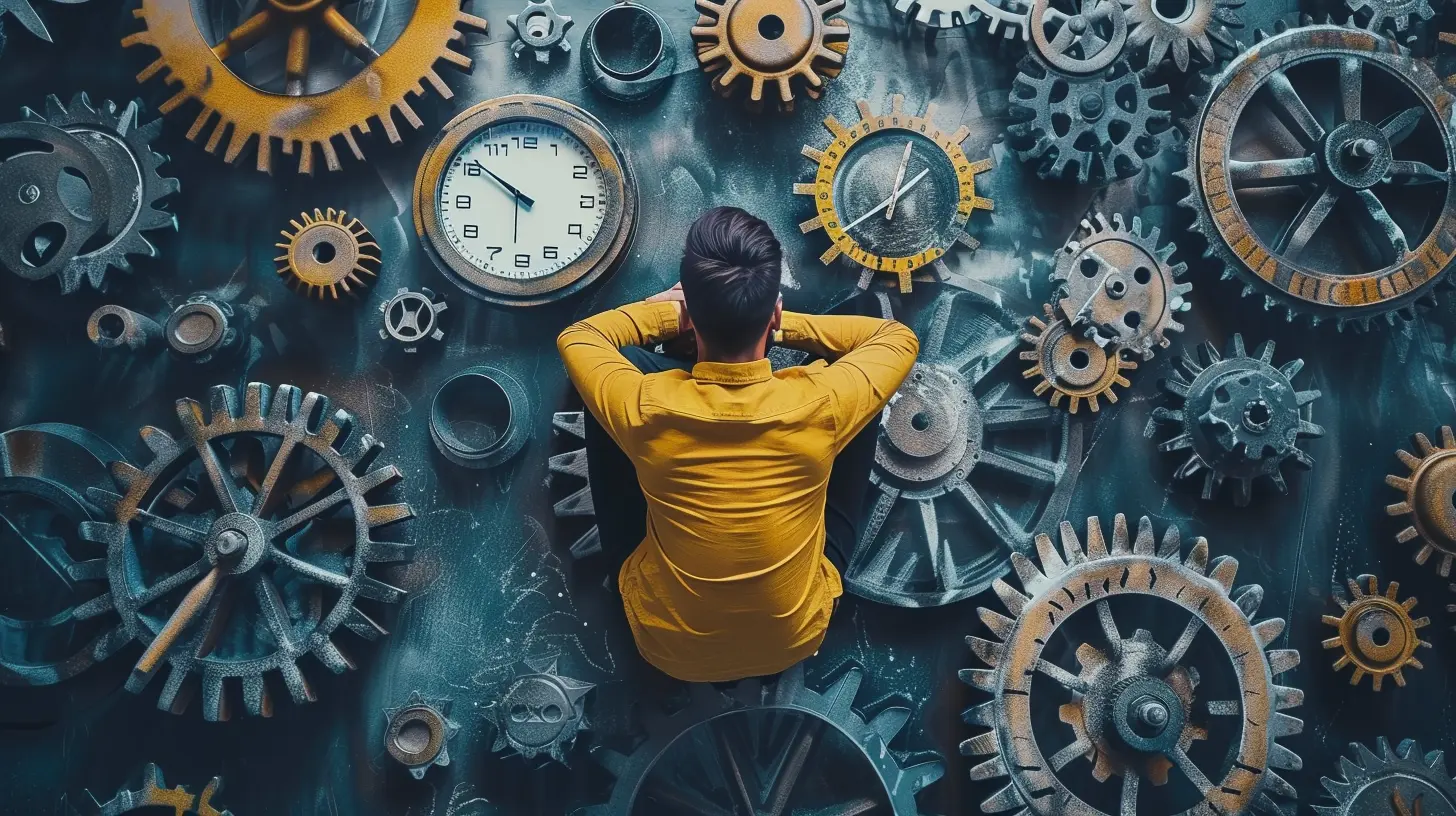The Power of Breaks: Why Downtime Enhances Productivity
28 August 2025
Let’s face it — we live in a hustle-harder generation. People wear their busyness like a badge of honor, chugging coffee, burning the midnight oil, and convincing themselves that grinding 24/7 is the only path to success. But here’s a wild thought — what if taking a break is actually the key to getting more done?
Sounds crazy, right? But it’s not. In fact, science (and a growing mountain of anecdotal evidence) backs it up: strategic downtime isn’t slacking — it’s smart. So, let’s dive into the not-so-obvious truth about why taking breaks might just be your secret productivity weapon.

Why We Feel Guilty About Taking Breaks
Before we talk about how awesome breaks are, let’s address the elephant in the room: break guilt.Ever sat down to take a breather, only to find your mind racing with all the things you “should” be doing? That’s productivity guilt talking. Society tells us that if we’re not always doing something, we’re wasting time. But time spent resting isn't wasted — it's invested.
Breaks give your brain a chance to file away information, recharge, and reset. Think of your brain like a smartphone. You wouldn’t expect it to keep running without ever charging it, right? So why should you expect that from yourself?

What Happens to Your Brain When You Don’t Take Breaks?
Okay, let’s geek out for a second.When you power through long hours without giving your brain a break, it’s like trying to watch Netflix with 12 tabs open and zero bandwidth. Everything slows down. Your focus dips. Mistakes creep in. And that “brilliant idea” you had? It suddenly looks more like a foggy mess.
There’s even a name for that brain fog: cognitive fatigue.
When you're mentally drained, your attention span shortens, your creativity takes a nosedive, and your decision-making becomes iffy at best. You become busy, not productive. And that's a huge difference.

The Science Behind Breaks and Productivity
Let’s sprinkle in some science here.Researchers have found that our brains naturally work in cycles called ultradian rhythms. These cycles last about 90-120 minutes. After that, our energy, focus, and alertness start to dip — hard.
This means no matter how motivated you are, your brain isn’t built to go full throttle for 8 hours straight. When you ignore these signals and push on, your efficiency drops. But when you honor your body’s rhythm and take short breaks, your brain resets and comes back stronger.
It’s like rebooting your computer — everything just runs more smoothly afterward.

The Different Types of Breaks (And When to Take Them)
Not all breaks are created equal. Some are little more than “break-shaped” distractions (hello, endless scroll on Instagram), while others genuinely recharge your battery. Let’s break 'em down.1. Microbreaks (30 seconds – 5 minutes)
These are the tiny pauses you probably don’t even think about — a quick stretch, a glance out the window, a sip of water. Don’t underestimate them. A few deep breaths or eye rolls can relieve tension and improve your mood.Take one every 20–30 minutes. Even standing up and shaking out your hands can re-energize your brain.
2. Short breaks (5–15 minutes)
This is where the real magic starts. You can go for a short walk, make tea, chat with a friend, or just step away from your desk. These breaks refresh your working memory and restore your focus.They’re like quick pit stops during a long road trip — essential to keep things running.
3. Lunch breaks (30–60 minutes)
Eat away from your desk. Seriously. Research shows that proper lunch breaks improve mood, reduce burnout, and spark creativity. Plus, it's a great time to unplug and live your life outside of school or work tasks.4. Mental health days (as needed)
Sometimes, you need more than a few minutes. And that’s okay. Mental health days give you a chance to hit the reset button in a deeper, more lasting way. It’s not weakness — it’s maintenance.How Breaks Boost Productivity
Still skeptical? Let’s look at exactly how breaks supercharge your output.1. Improved Focus and Concentration
Taking breaks prevents your brain from getting overloaded. When you come back to a task after even a short pause, you're more likely to spot details you missed before and stay laser-focused.2. Enhanced Creativity
Some of your best ideas come when you’re not thinking about solving the problem at all — like in the shower or while doodling. Breaks allow your subconscious to keep working in the background.Think of it like marinating an idea — the longer it soaks, the richer it gets.
3. Reduced Stress
Stepping away gives your nervous system a chance to calm down. Deep breathing, nature, laughter — all of these reduce cortisol (the stress hormone) and help you come back with a fresh, clear mind.4. Better Decision-Making
When you're tired, your judgment gets murky. Breaks help you reset and make more rational, thoughtful choices.5. Prevention of Burnout
Burnout isn’t just about being tired. It’s emotional exhaustion, detachment, and a drop in performance. Regular breaks serve as your burnout prevention toolkit.
How to Make the Most of Your Breaks
Alright, breaks are great. But how do you make them actually effective instead of just a license to scroll social media mindlessly?Here are some pro tips to get the most mileage out of your pause:
1. Keep Screens to a Minimum
Step away from your computer or phone. Give your eyes (and your brain) a rest from digital assault.2. Move Your Body
Stretch, walk, dance — anything to get that blood flowing. Movement increases oxygen to the brain and releases feel-good hormones.3. Change Your Scenery
A change in environment can shift your perspective. Step outside, go to a different room, or even just turn your chair to face a window.4. Breathe (For Real)
Deep breathing reduces anxiety and resets your nervous system. Try the 4-7-8 technique: breathe in for 4 seconds, hold for 7, exhale for 8.5. Do Something You Enjoy
Read a page of a book, sketch something, play a quick game — breaks should feel like, well… breaks.Breaks in the Classroom: The Secret Weapon for Students
If you’re a student, breaks aren’t just beneficial — they're essential.Studying for hours on end without a pause actually leads to less retention. Your brain is like a sponge. Once it’s full of water, pouring more on it doesn’t help — it just spills over.
Using techniques like the Pomodoro Method (25 minutes of focus, 5-minute break) keeps your brain sharp and your motivation steady. Over time, you’ll not only learn more — you’ll also remember it better.
Breaks in the Workplace: How Employers and Employees Both Win
For professionals, breaks are productivity gold for individuals and entire teams.Progressive companies now encourage employees to take mental wellness breaks, nap pods, or even walking meetings — because they know productivity isn’t about grinding harder; it’s about working smarter.
A 2021 study showed that workers who took regular breaks were more satisfied, creative, and energized than those who didn’t. Bottom line: rested brains = better results.
How Often Should You Really Take Breaks?
There's no one-size-fits-all answer, but here's a general rule of thumb:- Every 25–30 minutes: Take a 5-minute break (use the Pomodoro method)
- Every 2 hours: Take a 15–20-minute break
- Every 4–5 hours: Take a full hour for lunch or rest
- Once a week: Take a longer break or rest day to fully recharge
The idea isn’t to follow this perfectly, but to listen to your body and mind. If you’re feeling foggy, cranky, or distracted — it’s break time.
Final Thoughts: Working Smarter, Not Harder
Here’s the truth we often forget in the chase for productivity: you’re not a machine.You can’t just flip a switch and go full speed endlessly. And you shouldn’t have to. Taking breaks is one of the simplest, most human ways to care for your mental health, improve your creativity, and actually get more done with less stress.
So next time you’re knee-deep in work or study, feeling the mental drain, don’t push — pause. Step away. Take a breath. And remember: breaks aren’t the enemy of progress; they’re the fuel behind it.
You’re not lazy — you’re recharging your superpowers.
all images in this post were generated using AI tools
Category:
Time ManagementAuthor:

Anita Harmon
Discussion
rate this article
1 comments
Darrow McGinn
Great insights! Incorporating regular breaks not only boosts creativity but also enhances focus. Essential reading for anyone looking to improve their productivity!
September 24, 2025 at 10:46 AM

Anita Harmon
Thank you! I'm glad you found the insights valuable. Regular breaks truly make a difference in enhancing both creativity and focus!

